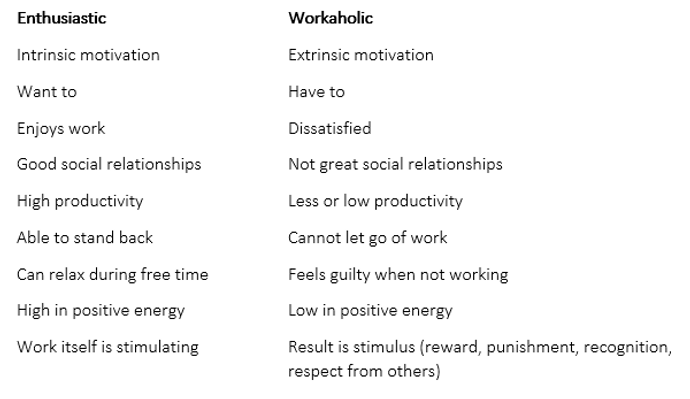Enthusiasm: more than just hard work
Both enthusiastic employees and workaholics will work hard, but in one case it is effective and in the other case eventually is destructive. Enthusiastic employees work hard because they are intrinsically motivated; their motivation comes from within. The do something because they themselves really want to do it and not because they are offered something for it, like the prospect of a higher salary. Intrinsic motivation is also an important resource for mental resilience and employees who are mentally resilient run less risk of burning out. In brief, enthusiastic employees are more fit for work long-term than unenthusiastic employees.
Workaholics are often driven by extrinsic motivation. In this case the driver is an external stimulus to do something: someone will work because their employer wants them to, and they need to pay the mortgage or because other people then respect them. Avoiding anxiety or punishment can also be an external stimulus to work hard. In these cases the motivation does not come from the inside.Differences between enthusiasm and addiction to work
It can be difficult to distinguish between an enthusiastic employee and a work addict. Both are hard workers who are dedicated and apparently tireless. But there is a major difference: workaholics often work not because they want to, but because they have to. Employees who are work-addicts have a greater risk of a burnout, depression, cardio-vascular illnesses and therefore of related absenteeism. Let's list the differences:

Detecting work addiction
There are questionnaires that can reveal an addiction to work, such as DUWAS, the Dutch WorkAholism Scale. This asks, among other things, whether you work an unusual amount (excessively), whether that is imposed (do you feel you need to do it for yourself), whether you can relax properly in your free time and alongside your work, whether you feel guilty if you are not working, and how often you think about work in your free time. Research into symptoms of (potential) addiction to work can form part of a Preventive Medical Examination (PME) or of a work experience survey.
What can you as a manager do to encourage enthusiasm among employees?
You as a manager will identify the symptoms of enthusiasm or addiction to work more rapidly if you are regularly meeting with your employees, especially with those who are always getting ahead. Ask them why they work so hard. Are they doing it because they find their work fun and interesting, or do they do it from a feeling that they "must do" it or it makes them feel better about themselves? You as a manager can encourage intrinsic motivation in your employees by:
Tips
- Starting up a dialogue about work: Ask your employees what drives and motivates them Do they derive energy from their work, or do they feel drained after a day or a week at work? Do they still feel their job suits them, or is it time for a change? What - apart from the salary - does work contribute to someone's life? Try using these kind of questions to dig into why someone comes to work each day.
- Creating autonomy at work: You do this by giving your employees enough freedom to organise their own work. Employees with autonomy have the possibility of organising their work for themselves and of managing their time themselves. If someone has the freedom to decide for themselves what they do and how they do it, they are more likely to become intrinsically motivated than if someone else tells them what to do. Making your own choices, solving problems and making suggestions creates a feeling of responsibility and managing yourself.
- Giving regular feedback: To encourage the behaviour that you want to see, it helps to provide positive feedback. To do this, you state what someone has done, and what you really like about it. For example, pay compliments for effort and contributions, take a moment to talk about successes, provide support in the case of mistakes and be honest if your employee is not on the right track. What is important is that you are not talking about what someone is, but what they are doing. Negative feedback that is directed at the person, is very demotivating and feels like rejection.
It is also good to know here that enthusiasm is positively influenced by the existence of personal resources such as hope, resilience and optimism and work-related resources. Investing in these resources is therefore worth the effort. As a manager you have more influence on the work-related resources, but you can also help with the development of the personal resources. If you would like to learn more about this, then read this article about mental resilience.